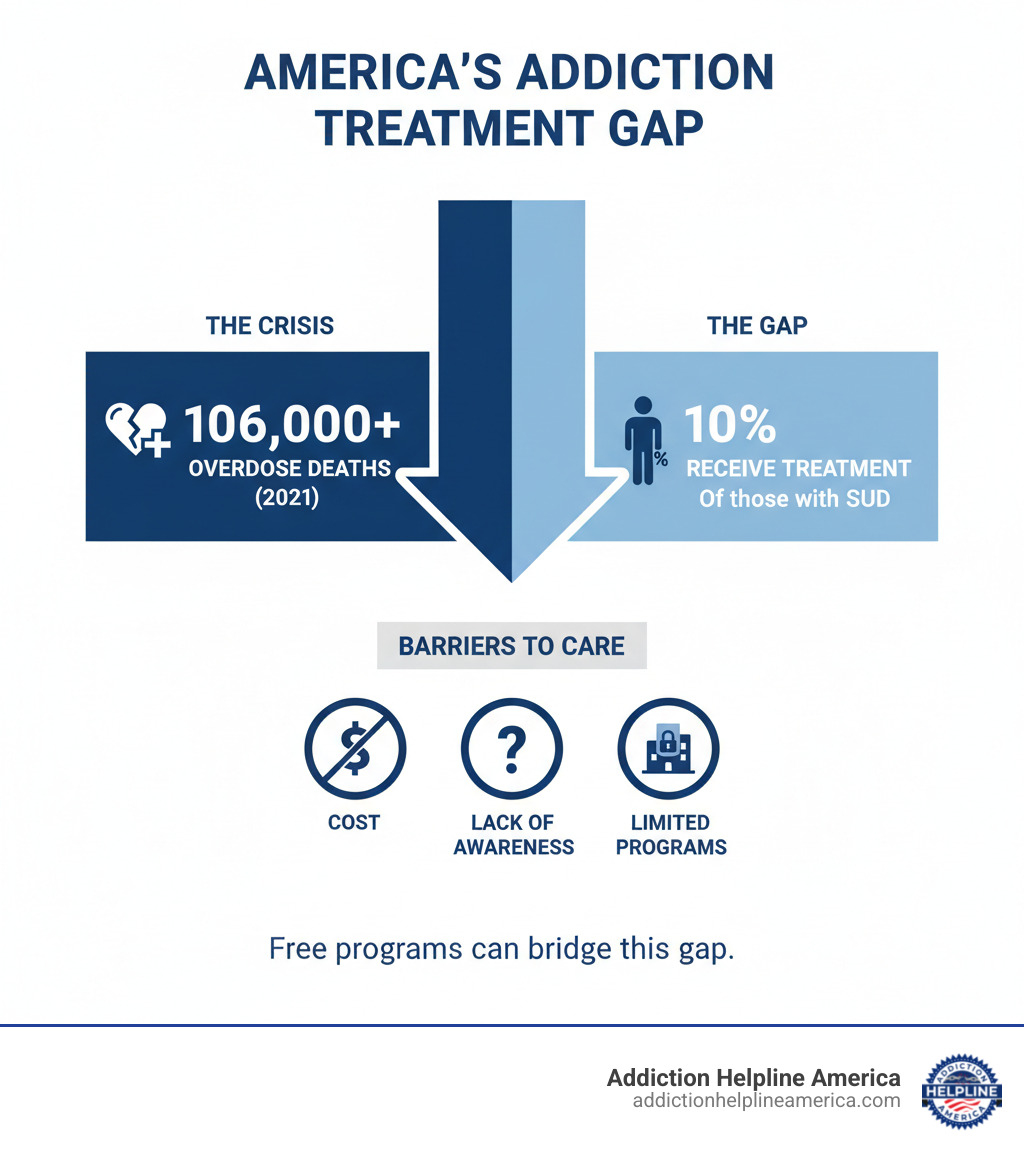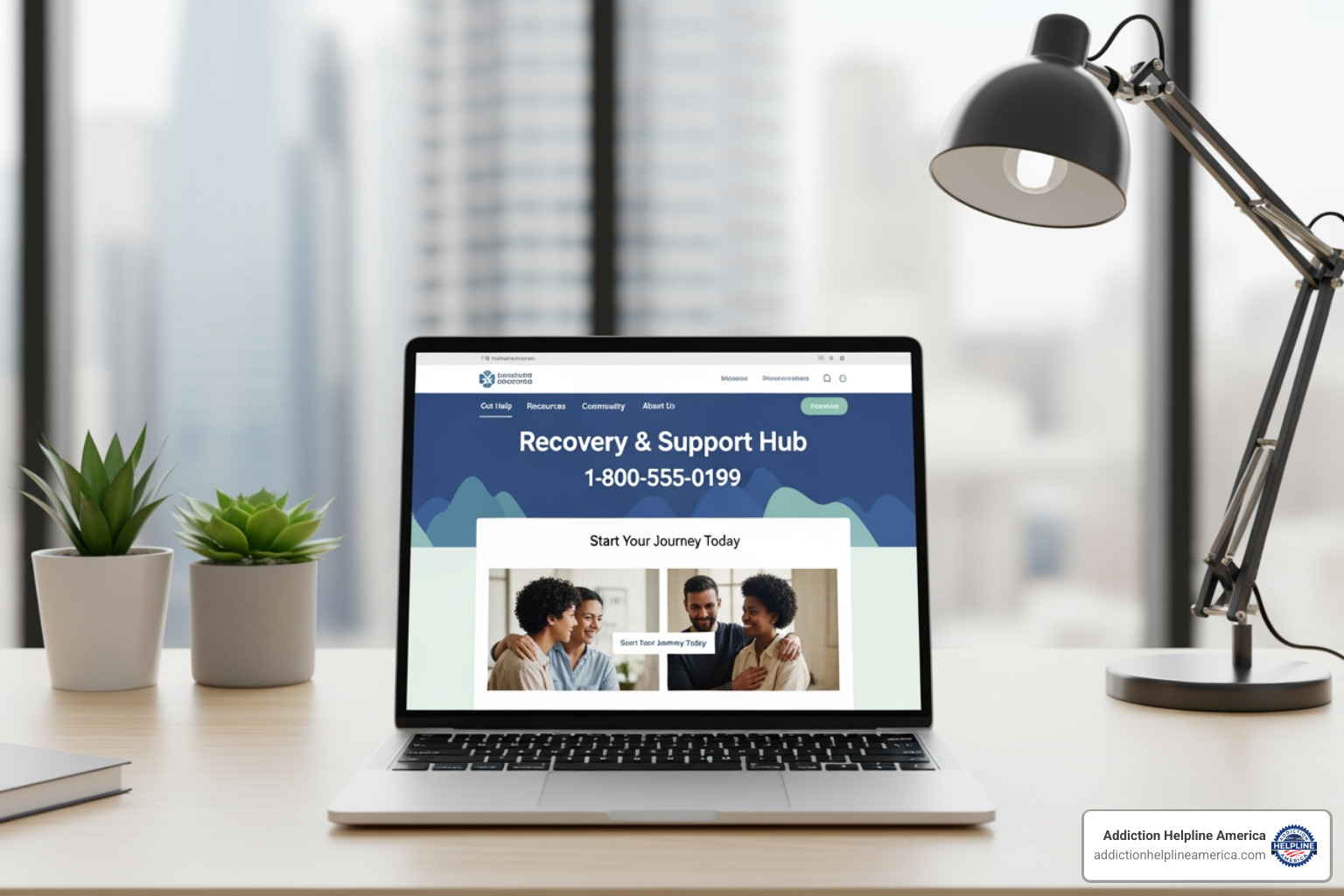
Why Free Addiction Programs Are a Lifeline for Millions
Free addiction programs provide life-saving treatment to those who cannot afford traditional rehab. Here’s what you need to know:
What Are Free Addiction Programs?
- Government-funded rehab centers – State and federally funded facilities offering detox, inpatient, and outpatient services.
- Faith-based organizations – Religious programs providing residential and community support.
- Non-profit treatment centers – Charitable organizations funded by donations and grants.
- Sliding-scale clinics – Community health centers that adjust fees based on income.
- Peer support groups – Free 12-step and non-12-step meetings available in most communities and online.
Who Qualifies?
Most free programs require proof of residency, income verification, and lack of insurance. Some prioritize pregnant women, veterans, and those with co-occurring mental health disorders.
The statistics are sobering: over 106,000 Americans died from drug overdoses in 2021, yet only 10% of people with a substance use disorder receive treatment each year. The biggest barrier is cost. Many believe they can’t afford help, but free addiction programs exist to bridge this gap.
Funded by government grants, Medicaid, nonprofits, and donations, these programs may lack luxury amenities but provide the same evidence-based therapies—medical detox, counseling, and group therapy—that save lives.
At Addiction Helpline America, we connect individuals and families with free addiction programs nationwide. We provide confidential, personalized support to help people find the right treatment, ensuring no one is left behind because they can’t afford care.
Free addiction programs basics:
Top 7 Websites and Resources for Free Addiction Programs
Struggling with addiction is hard enough; finding help shouldn’t be, especially when money is tight. The good news is that free addiction programs are more accessible than you might think. At Addiction Helpline America, we’ve helped thousands find treatment without overwhelming costs. We know the right resource can change everything, which is why we created this guide to the top seven ways to find free support—all of which we can help you access.
1. Addiction Helpline America: Your Trusted Resource for Free Addiction Help
Addiction Helpline America is a comprehensive directory for treatment options in all 50 states and D.C. We offer free, confidential support to help you find the right program for your unique situation. Our platform connects you with no-cost and sliding-scale programs nationwide, from detox to outpatient therapy. What makes us different is our personalized guidance. Our admissions navigators are available 24/7 to answer questions, explain your options, and help you take the first step toward recovery without pressure or judgment.
Find free addiction programs near you
2. State and Local Resources via Addiction Helpline America
Every state funds addiction treatment through public agencies. These publicly funded centers are lifelines for those without insurance or financial resources, offering services from detox to outpatient care. Navigating state-specific eligibility and applications can be challenging. Addiction Helpline America provides guidance on accessing these state-funded and local programs, helping you with requirements like proof of residency and income verification. We use publicly available state and local directories to find what’s available in your area, ensuring you don’t miss out on support that’s waiting for you.
Find state and local free rehab options
3. Faith-Based and Non-Profit Programs Listed on Addiction Helpline America
For many, faith is a powerful part of healing. Many faith-based organizations offer free addiction programs combining spiritual guidance with peer support. These programs often integrate work or religious activities into recovery, though some may require prior medical detox. For those seeking a spiritually grounded path, they can be transformative. Additionally, many non-profit organizations funded by donations offer low-cost residential and outpatient care. Addiction Helpline America lists both faith-based and non-profit programs to help you find one that aligns with your goals.
4. Community Health Centers and Clinics via Addiction Helpline America
Federally funded community health centers are hidden gems, operating on a sliding scale based on income, with many offering free services to those who qualify. They provide integrated care for both substance use and mental health support, which is vital since these issues often co-occur. We can help you locate a center near you and steer the application process. You may also be eligible for Medicaid, Medicare, or other financial aid. We’re here to help you explore every affordable option.
Find a community health center
5. Online Peer Support Communities Curated by Addiction Helpline America
Recovery thrives in community, making online peer support communities a vital, free, and accessible resource. Virtual support groups offer forums and chat rooms for sharing experiences and getting anonymous help. Options include both 12-step fellowships and science-based alternatives, with free online and in-person meetings. With 24/7 availability and peer encouragement, these groups are an incredible complement to professional treatment. Addiction Helpline America can help you access these supportive communities.
Access online support resources
6. National Helplines and Support Services via Addiction Helpline America
For immediate help, national helplines provide free, confidential, 24/7 support, offering treatment referrals and information for those in crisis. Options include a national treatment referral line, the 988 Suicide & Crisis Lifeline for mental health emergencies, and other crisis lines for trauma-related counseling. While Addiction Helpline America provides personalized guidance, these national helplines are crucial first contacts that can direct you to free addiction programs.
Call the Addiction Helpline America hotline
7. Specialized Support for Vulnerable Populations through Addiction Helpline America
Some groups require specialized support. Addiction Helpline America connects vulnerable populations with culturally-sensitive care designed for their needs. Veterans can access benefits for addiction treatment, with community care programs expanding options. Pregnant women often receive priority placement in state-funded programs to protect both mother and child. For Indigenous peoples, we help find specialized programs that respect cultural heritage and community values. Finding the right program means finding one that understands your unique journey.
Find specialized support resources
Understanding the Landscape of Free Addiction Treatment
Understanding what free addiction programs offer, who qualifies, and what to expect can make all the difference. These programs vary, so let’s review what they typically include, their eligibility requirements, and potential trade-offs.
What’s Included in a free addiction program?
While ‘free’ may sound too good to be true, these programs are comprehensive, offering the same core services as paid facilities. The funding source is the main difference, not the quality of treatment. Key components include:
Medical detox: Withdrawal from substances like alcohol or opioids can be dangerous. Free programs often provide medically supervised detox to manage symptoms and ensure safety.
Inpatient or outpatient treatment: Inpatient (residential) treatment provides a structured, 24/7 drug-free environment, ideal for intensive support. Outpatient programs offer flexibility, allowing you to live at home while attending scheduled therapy, which helps if you have work or family commitments.
Individual counseling: One-on-one sessions with a therapist help you address the root causes of addiction, learn coping skills, and set recovery goals.
Group therapy: Sharing with others who have similar experiences provides powerful support, perspective, and a sense of community.
Aftercare planning: Good programs connect you with ongoing support like sober living, continued counseling, or peer groups (AA/NA) to help you maintain recovery. As the National Institute on Drug Abuse notes, effective treatment is customized and comprehensive, and these principles apply to free programs as well.
Eligibility and How to Apply for free addiction programs
Free programs are designed for those who can’t afford private treatment. While requirements vary, most ask for:
- Proof of residency in the program’s state or county (e.g., utility bill, ID).
- Income verification to show financial need (e.g., pay stubs, tax returns).
- Lack of insurance: Most programs serve the uninsured or underinsured.
- Legal U.S. residency or citizenship.
The process typically starts with a screening call, followed by a clinical assessment to create a personalized treatment plan. After completing paperwork, you’ll be admitted, though be aware that waiting lists can exist due to high demand. Our admissions navigators at Addiction Helpline America can guide you through each step, from gathering documents to preparing for admission.
Potential Limitations of Free Services
Free addiction programs are lifesaving but have limitations. Understanding them helps set realistic expectations.
- Waiting lists: Due to limited funding and high demand, immediate entry isn’t always possible. Don’t let this discourage you, as urgent cases are often prioritized.
- Basic amenities: Facilities are functional and clean, but don’t expect luxury. The focus is on treatment, not comfort, which can mean fewer distractions.
- Higher staff-to-patient ratios: Counselors may have larger caseloads, meaning less one-on-one time. Group therapy and peer support become especially important.
- Less flexible program duration: Timelines may be fixed due to funding, unlike private facilities that might allow for extensions.
However, cost doesn’t determine quality. Many free programs are licensed, accredited, and staffed by dedicated professionals providing evidence-based care. The core principles of effective addiction treatment are still the focus. At Addiction Helpline America, we help you find the best available option—the one that offers real help when you need it.
Specialized Support and Co-Occurring Disorders
Recovery is different for everyone, and some people need specialized care. Whether you’re a veteran, a pregnant woman, or dealing with a co-occurring mental health disorder, many free addiction programs are designed to address your specific situation.
Finding Help for Vulnerable Populations
Certain groups face unique challenges and require specialized support, which we can help you find.
Veterans and active military personnel can use VA benefits for addiction treatment programs that understand military-related trauma. While waiting lists can occur, the VA’s community care program provides other options. Our navigators can guide you through these resources.
Pregnant women often get priority access to state-funded free addiction programs. These facilities offer integrated services for both recovery and prenatal care to ensure the health of mother and child.
Indigenous peoples deserve culturally sensitive care that honors their traditions. We can connect you with programs that incorporate traditional healing practices with modern therapies, respecting your heritage and community values.
Find specialized support resources
Addressing Co-Occurring Mental Health Disorders
About half of people with a substance use disorder also have a mental health condition like depression or anxiety. This is a dual diagnosis, and treating both simultaneously is critical for success.
Many free addiction programs offer integrated treatment for co-occurring disorders, where one team addresses both your addiction and mental health. Your assessment will include mental health screenings to create a comprehensive plan, which may involve specific therapies, medication management, and education on how the conditions interact.
Finding a program that treats dual diagnosis is essential for lasting recovery. You deserve care that addresses your whole self, and we can help you find it.
If you are in crisis, Call or text the 988 Suicide & Crisis Lifeline for free, confidential support 24/7. You are not alone.
Frequently Asked Questions About No-Cost Rehab
It’s natural to have questions about free addiction programs. At Addiction Helpline America, we want to provide honest answers to the most common concerns.
Is free rehab really effective for addiction recovery?
Yes, free addiction programs can be highly effective. Success depends on the quality of care and your commitment, not the price. Free facilities are often licensed, accredited, and offer the same evidence-based therapies as paid ones. According to the National Institute on Drug Abuse, quality programs reduce relapse and improve outcomes. While they lack luxury amenities, they provide the essential components for recovery: medical supervision, counseling, and aftercare. The staff are dedicated professionals who care about helping people heal. Don’t let ‘free’ make you doubt the quality—recovery is possible regardless of cost.
How long do free rehab programs last?
The duration of free addiction programs varies based on individual needs and facility capacity. Common timeframes include:
- Short-term programs (around 30 days): Focus on detox and stabilization.
- Medium-term programs (60 to 90 days): A common length for residential treatment, allowing time to develop coping skills. Research shows 90 days significantly improves outcomes.
- Long-term programs (90+ days): Valuable for severe addiction or co-occurring disorders, allowing for deeper therapeutic work.
A clinical assessment will help determine the right length for you. While some free programs have fixed durations, many are flexible and work to provide care for as long as needed.
What’s the difference between inpatient and outpatient free programs?
The main difference is where you live during treatment and the intensity of care.
Inpatient programs (residential): You live at the facility 24/7 in a structured, supervised, and trigger-free environment. This includes round-the-clock medical supervision (vital for detox) and a full schedule of therapy and activities. It’s best for severe addictions or when your home environment is not supportive.
Outpatient programs: You live at home and attend scheduled treatment sessions at a facility. This offers flexibility to maintain work, school, or family duties. Programs vary in intensity, from Partial Hospitalization (PHP) several hours a day to standard weekly counseling. Outpatient is often recommended for milder addictions or as a step-down from inpatient care.
Both approaches can be successful. The right choice depends on your addiction severity, home environment, and personal responsibilities. Our navigators can help you decide which option is best for you.
Conclusion: Your Path to Recovery Starts Today
Taking the first step toward recovery is a brave act. Remember: you don’t have to do it alone, and cost should not be a barrier. This guide has shown that free addiction programs offer comprehensive, effective care—from detox to aftercare. They are lifelines staffed by dedicated professionals, proving that recovery is possible for everyone.
Despite sobering statistics on overdose deaths and the treatment gap, resources like state-funded centers, non-profits, and peer support groups exist to break down financial barriers. Seeking treatment has profound benefits: it reduces relapse, improves mental health, and rebuilds lives and families. Early intervention is critical to preventing further health, social, and legal troubles.
At Addiction Helpline America, our mission is to ensure no one is left behind because they can’t afford care. We connect people in all 50 states and D.C. to the right free addiction programs with free, confidential, and personalized guidance. Your story doesn’t end with addiction. Recovery is happening every day for people who felt just as overwhelmed as you might now. Your path to recovery can start today. The support is real, and we are here to help.
Our helpline is 100%
free & confidential
If you or someone you care about is struggling with drug or alcohol addiction, we can help you explore your recovery options. Don’t face this challenge alone—seek support from us.
Programs
Call Our 24/7 Free & Confidential Addiction Helpline
Will my insurance
cover addiction
treatment?
We're ready to help
Find the best
drug or alcohol treatment
center
Are you or a loved one struggling with addiction? Call today to speak to a treatment expert.
















